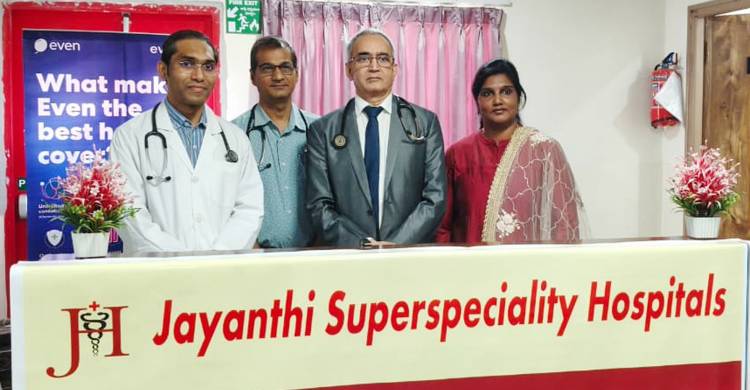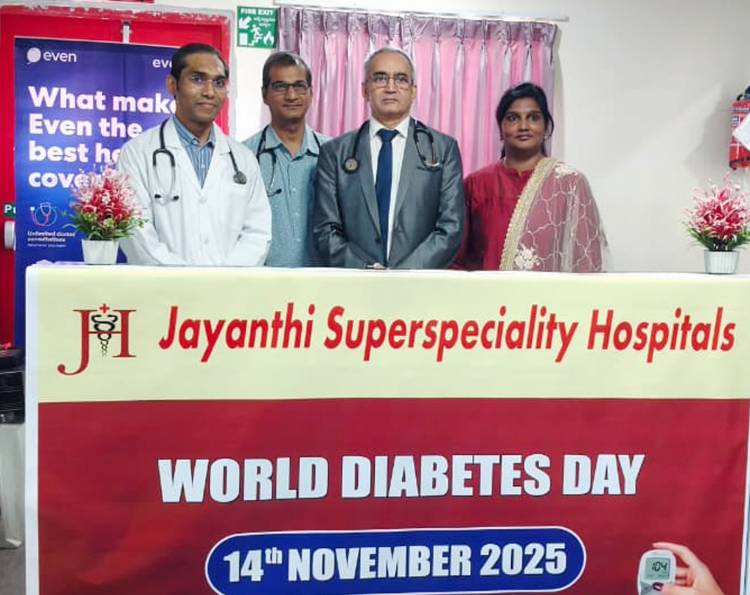Jayanthi Hospital sounds alarm on Diabetes surge & its life-threatening complications, on World Diabetes Day!
Jayanthi Super Specialty Hospital, a leading super-specialty healthcare facility offering advanced medical care, unveiled an awareness campaign to highlight the alarming rise in diabetes cases and the surge in related chronic ailments affecting the heart, brain, and kidneys, today at SR Nagar. The initiative coincides with World Diabetes Day, observed every year on November 14, marking the birth anniversary of Dr. Charles Banting, the scientist who discovered insulin.
Diabetes has evolved into a major public health challenge worldwide, particularly in India, once called the “Diabetes Capital of the World.” The condition affects nearly 100 million adults across the country and is known to damage vital organs such as the heart, brain, kidneys, and vascular system.
The 2025 World Diabetes Day theme, “Diabetes and Wellbeing, emphasizes not only medical management of Diabetes, but also the importance of mental, emotional, and holistic wellbeing for those living with diabetes.
Telangana, ranking fourth in India for diabetes prevalence, faces a worrying trend with rising cases even among people in their twenties. The state’s diabetes incidence ranges between 14% and 18.1%, compared to the national average of 8.7% among adults aged 20–70 years, almost double of the national average. Experts attribute this sharp increase to urban lifestyles, poor dietary habits, and sedentary lifestyle.
According Dr Sarat Chandra K., Sr. Cardiologist and Managing Director, Jayanthi Super Specialty Hospital; the steep rise in diabetes cases is having a cascading effect on public health. 80% of Diabetic patients have high blood pressure, which indicates the severity of the problem. These two are referred to as metabolic problems, because of which quality of life deteriorates and shortens our life span. We are witnessing an increase in heart attacks, heart failure, strokes, and kidney failure, all linked to diabetes. Over time, diabetes damages the blood vessels, which can result in gangrene, stroke, or organ failure. Alarmingly, most patients requiring kidney transplants are already diabetic. Diabetes among children is different from adult diabetes, it is usually due to genetic problem and the damage to the pancreas leads to this condition.
Desk side jobs are a cause for the rise in Diabetes incidence, Telangana and Hyderabad have high percentage of such jobs and therefore the population prone to diabetes is also high. A healthy lifestyle is the first line of defence. Regular health checks and maintaining key parameters with A1c below 7%, systolic blood pressure under 130 mm Hg, and LDL cholesterol below 70 mg/dL; can help prevent serious complications, says Dr Sarat Chandra.
Dr. Praveen Kumar Etta, Nephrologist, Jayanthi Super Specialty Hospital; said, Diabetes is a major burden for kidney disease, almost 50% of the kidney disease patients we see in Outpatient are Diabetic. In such patients kidney disease progresses rapidly, as they will be suffering from Hypertension, heart disease and other comorbid conditions, most of them end up needing regular dialysis. Regular diagnosis, early detection of disease progression and preventive measures help manage the disease and restore better quality of life for the patient.
Dr. Pynam Pranuthi, Neurologist, Jayanthi Super Specialty Hospital; said, stroke is the leading cause of death in the world and permanent disability. Every year around 100 to 150 patients per lakh population are affected by stroke in India. 65% of stroke patients are found to be diabetic. Diabetes leads to clots in the brain resulting in stroke. Uncontrolled diabetes also leads to diabetic peripheral neuropathy, which impacts their quality of life significantly, resulting in imbalance while walking, burning sensation in legs, painless injuries etc. Good glycaemic control, improved lifestyle and diet adjustments can help prevent such complications.
Dr. Sundar Singh, General Physician, Jayanthi Super Specialty Hospital; said, lifestyle management, diet control, meditation and medical management help in controlling diabetes and the complications it can lead to. The diet should be balanced diet, mainly we should consume low carbohydrate diet, 20 to 25% protein, 20 to 25% healthy fat and avoid maida. The reason for Indians being more prone to diabetes is our habitual consumption of high carbohydrates in the form of rice in South India and wheat in North India of up to 60% to 70% of our diet, which if we can reduce to 40%, helps in bringing down the number of diabetics. Sedentary lifestyle is another cause, at least 150 minutes per week of physical activity like walking, jogging, swimming can be beneficial.
While the statistics are concerning, experts are optimistic that early diagnosis and effective control can enable patients to lead long, healthy lives. Advances in diabetes care, including SGLT2 inhibitors and GLP1 analogues, are showing exceptional promise in managing weight, reducing heart failure, and improving kidney health. Additionally, bariatric surgery is emerging as a viable treatment option for obese patients battling diabetes and related disorders. With the advanced treatment modalities and drugs available now, we can control the disease and delay further deterioration.






















